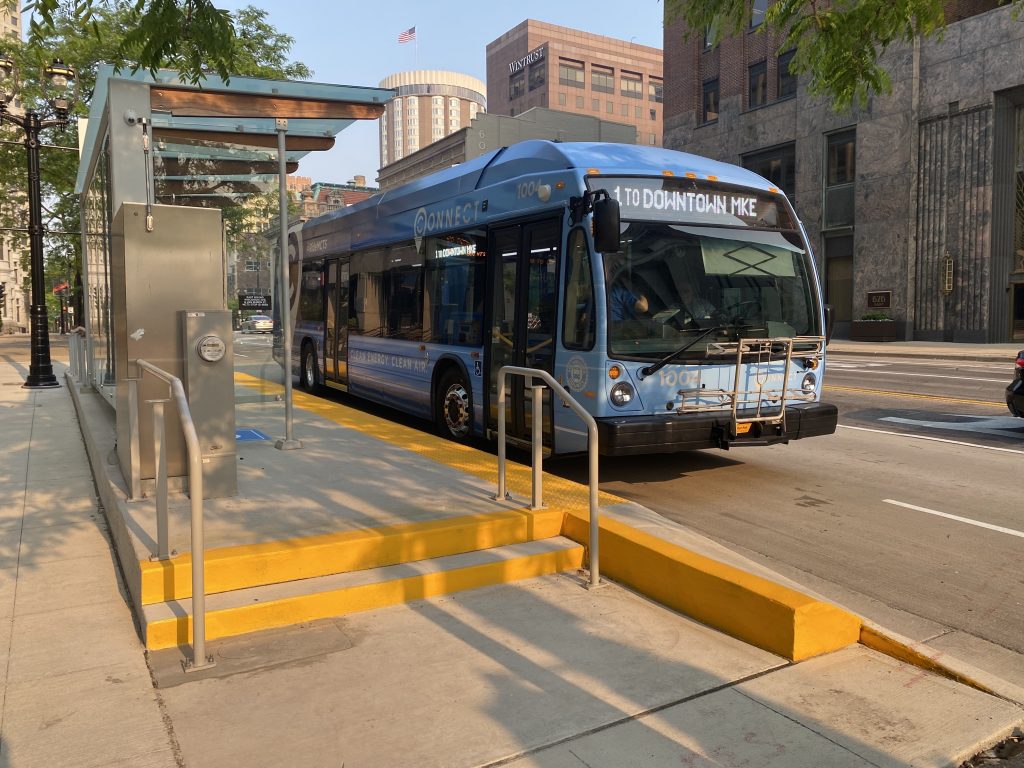Facing Transit Deficit, Supervisors Target Free Riders
Big problem with cheaters. MCTS data suggests one in four riders evade payment.

MCTS Connect 1 at Wisconsin Avenue Stop. Photo by Graham Kilmer.
The Milwaukee County Transit System (MCTS) is now telling policymakers one in four bus riders do not pay a fare, costing the system millions annually, according to county supervisors.
Sup. Shawn Rolland has authored a resolution directing MCTS to develop a “data-informed fare compliance strategy aimed at strengthening revenue and ensuring longterm system sustainability without compromising rider or operator safety,” according to a statement released by the county board. Supervisors Jack Eckblad, Kathleen Vincent, Patti Logsdon and Sky Z. Capriolo have signed on as sponsors.
The transit system is estimating that 25% of riders do not pay a fare and that it is cost the system as much as $4 million annually at the farebox. After Mass Transit funding from the State of Wisconsin, passenger revenue is the largest source of funding for the transit system. In 2023, MCTS collected just over $22 million in passenger revenue, often referred to by transit professionals as farebox revenue.
“The fact that it’s one in four people, I think should strike everybody as far too much,” Rolland said.
In June, MCTS announced a projected $10.9 million budget deficit for 2025. The news came as a surprise to county officials, who had not been informed of the deficit until the transit system announced it in the press. The fare evasion data comes after supervisors started seeking more information about the deficit and what’s causing it.
MCTS told Rolland it arrived at the fare evasion figure based on surveys and passenger data. Urban Milwaukee asked MCTS to clarify how it reached its conclusion on fare evasion. The transit system has not responded as of publishing.
“I can tell you, I take the bus all the time, and especially on the Connect 1 [MCTS’ bus rapid transit services], I see people getting on the bus without paying,” Rolland said.
The Connect 1 includes off-bus fare validators that allow passengers to pay while they wait for the bus, but it also creates greater opportunity to board without paying, or forgetting to pay, Rolland said. The transit systems security seems to work, though. When security has boarded the bus and asked for proof of fare, passengers are quick to volunteer that they haven’t paid, he said. Many of these people appear to be white collar professionals heading downtown for work.
“That was instructive to me to say that we have a culture of fare evasion and non-compliance, and we need to have a plan to turn this around,” Rolland said. “And if the option to pay outside of the bus is the contributor to that, then I think we need to reconsider it.”
In a statement announcing his resolution, Rolland noted that decreased farebox revenue is now translating to decreased service. When the transit system revealed the budget deficit, it also announced plans to cut bus frequency.
“A single mother working several jobs should not have to wait longer for her bus because others refuse to pay $2 to ride,” Rolland said.
The Amalgamated Transit Union 998 (ATU 998), which represents bus operators and mechanics has been pushing MCTS to address fare evasion in recent years, arguing it is costing the transit system millions.
“Operators are sick of it,” ATU 998 Vice President Michael Brown recently told Urban Milwaukee. “Now they’re talking about deficit, well, collect some fares. You got new security, right?”
In 2024, MCTS created a new security team. The security officers are employed by MCTS, as opposed to the private security personnel supplied by Allied Universal that the system has used for years. The new security team isn’t big enough to handle everything, though, and MCTS still contracts with Allied Universal.
ATU leaders have repeatedly argued that MCTS doesn’t actually have any idea how many people are riding for free, and therefore no idea what the real system ridership is. Buses have a button operators are supposed to push when riders get on without paying a fare. But on the vast majority of MCTS buses, the button is located above the driver in an area that requires them to stop the bus and stand up to press it.
“I just retired as a bus operator in February,” said Tom Stawicki, legislative director for ATU 998. “It got to be such a joke I didn’t even push the button anymore.”
MCTS instructs operators not to enforce fare collection. Fare disputes are the most common cause of conflict between bus operators and passengers, according to MCTS data. That’s also true across the country. National transit data has long shown the majority of assaults on bus operators occur during a fare dispute.
Supervisors want a plan for curbing fare evasion, but they also want to make sure “any new enforcement tools or personnel do not increase safety risks for drivers or passengers,” according to their statement.
Rolland’s resolution also asks for an enforcement plan specific to Connect 1, where MCTS data suggests fare evasion is higher on average than the rest of the system. That plan would be due to the board by September, and could include removing off-bus fare validators.
If you think stories like this are important, become a member of Urban Milwaukee and help support real, independent journalism. Plus you get some cool added benefits.
Transportation
-
Congestion Pricing Cuts Air Pollution in New York City
 Dec 14th, 2025 by Jeff Wood
Dec 14th, 2025 by Jeff Wood
-
FTA Tells Milwaukee to Crack Down on Fare Evasion — Even Where Fares Don’t Exist
 Dec 12th, 2025 by Graham Kilmer
Dec 12th, 2025 by Graham Kilmer
-
Will GOGO’s Bus Service Ever Get Going?
 Dec 9th, 2025 by Jeramey Jannene
Dec 9th, 2025 by Jeramey Jannene






















25% don’t pay? Nonsense, at least not on the 30 or the Green Line. Maybe Connect One. I thought they were kind of asking for cheating by requiring riders to pay at the bus stop.
I recently rode the 15 for a short stint. Two riders got on: one of them had an empty card that gave the “no payment” beep and another just shrugged at the driver and walked to the back of the bus.
I think the payment stations for the Connect 1 are confusing. When first installed, I thought they were for all buses that used the Connect 1 stops. It wasn’t until an operator told me when I was getting off that they were only for the Connect 1 that I started using them properly. MCTS still got its fare–just for the wrong route. I don’t think it was ever explained properly. I have always questioned why they were installed. I don’t think it saves that much time and there is also the option of paying once on board. Another example of wasted money by a pathetic excuse for a management team. I reiterate–major changes in MCTS management must be made before there’s a chance of even a slight improvement in the system. I am not the only transit rider seriously considering a move to Waukesha. MCTS is no longer reliable like it once was. I am not the only person who has been late for an appointment because of its habit of not adhering to the schedule. I need reliable transportation and MCTS no longer fits the bill.
I agree jmpehoski. Transit is not a foward looking, proactive organization. They focus on the politics and not outcomes. There is almost no attention paid to the quality of transit services on the street. We just hear “give us more money and itll all get better.” They will blame non paying customers but this is a deflection. It’s convenient that suddenly theyve chosen to make this an issue. I agree… MCTS needs an experienced, sophisticated leadership team. One that has vision and hyper-focused on outcomes. Not sitting around, waiting for something bad to happen then spinning a story. Maybe a GM that has a career in front of them… not one that is at the end of their career. AND and iversight body that knows transit.